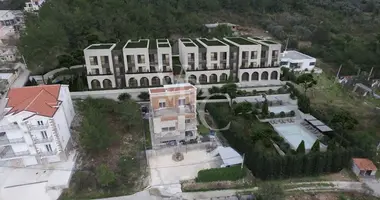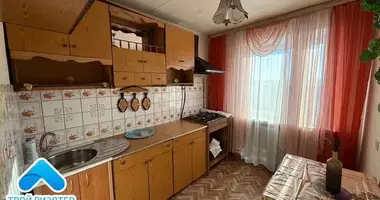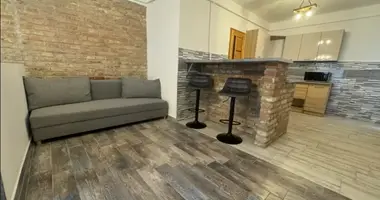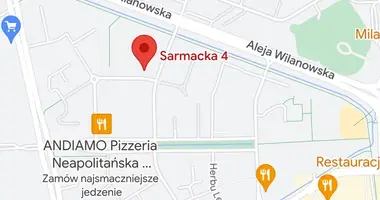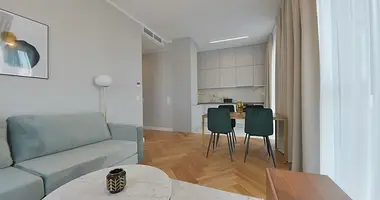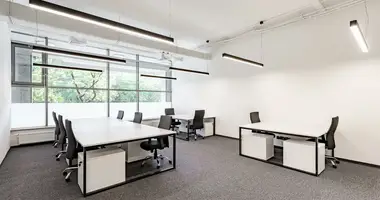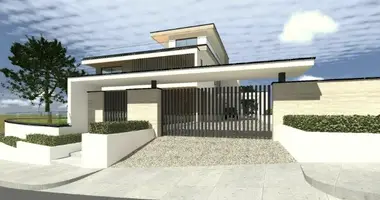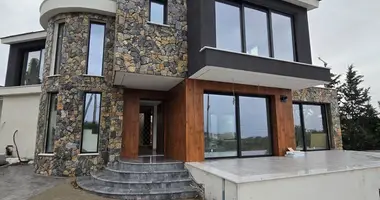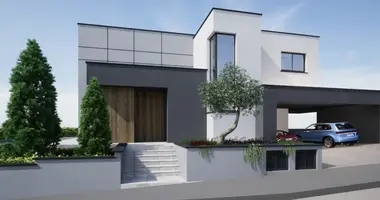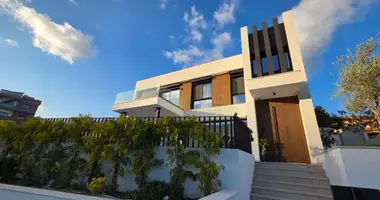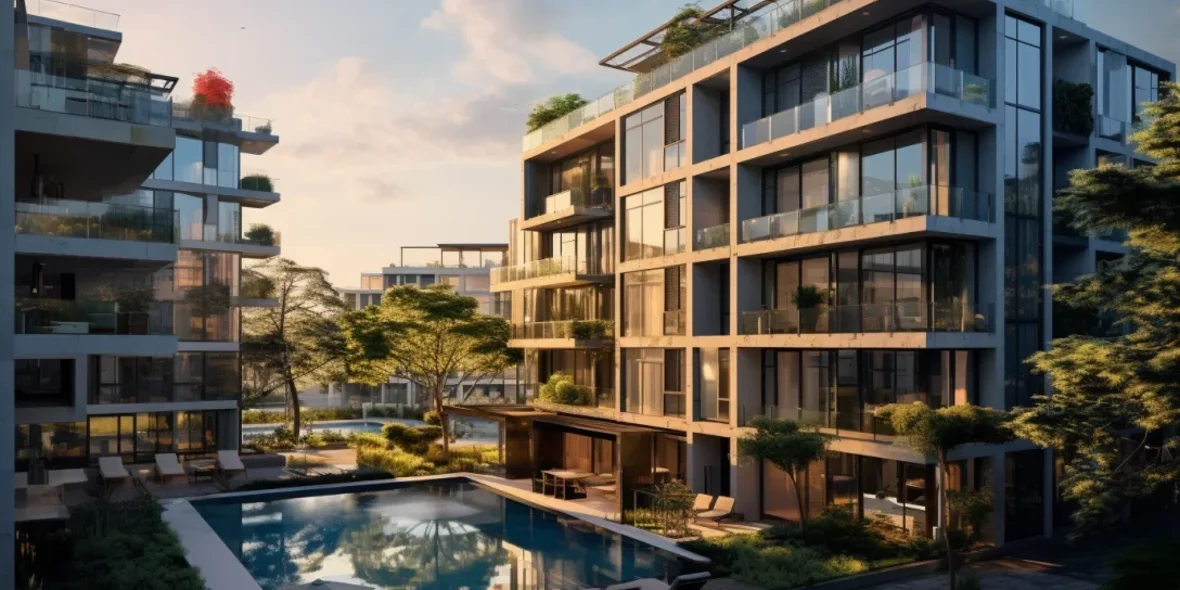
What Kinds of Houses Are There? 30+ Types of Housing in the World — From Apartments to Castles
The residential real estate market may seem straightforward, creating the impression that there are only a few types of homes, primarily two: apartments and houses. In reality, the global market includes more than 30 architectural and functional housing types, which differ by ownership structure, construction principles, climate conditions, and cultural traditions.
Some of these housing types are specific to certain regions. For example, yurts are found in Central Asia, cave houses exist in Turkey, and treehouses are common in Scandinavian countries.
We have prepared an overview of various types of residential properties encountered worldwide — from standard apartments and townhouses to bunkers and pseudo-mansions.
Housing by Ownership and Organizational Model
This classification groups properties not by their construction but by ownership format and allocation of property rights. These models determine who owns common areas, who pays for building maintenance, and what legal restrictions apply when selling or renting out the unit.
Condominium (Condo)
A condominium (condo) is a residential unit within a multi-unit building or complex, where the owner has private ownership of their individual unit (apartment) and additionally holds a shared ownership interest in the building’s common areas—such as staircases, hallways, elevators, parking facilities, and shared infrastructure.
The key difference between standard apartments and condominiums is the payment structure. Apartment owners typically pay only for utilities, whereas condo owners must additionally make monthly payments to the HOA (Homeowners Association). In a condominium, any renovations or leasing of the property usually require HOA approval.
Condominiums are especially common in:
- United States.
- Canada.
- Singapore/Hong Kong.
- United Arab Emirates (Dubai).
According to CBRE, 71% of all new residential construction in Toronto is delivered as condominiums, representing the highest share in Canada in the past 15 years.
Apartments (Apartment)
Apartments are the most widespread type of housing worldwide. In terms of real estate classification, an apartment is an individual residential unit within a multi-unit building, fully matching the definition of a flat. The key distinction is that apartments are almost always rental properties rather than privately owned units.
Apartments for Sale Around the World
The main difference from a condominium lies in the ownership rights. When a person rents an apartment, they do not manage the building’s common areas, do not participate in maintenance decisions, and do not bear the associated expenses. All management responsibilities are handled by the property management company or the landlord.
Just like conventional flats, apartments can be classified into:
- Studios.
- Penthouses — units located on the top floors with panoramic views and a terrace.
- Duplexes and Triplexes — units where living space is distributed over two or three internal levels.
Co-op / Cooperative Housing
A cooperative (co-op) is one of the most unique forms of residential ownership. Externally, a co-op may look identical to a typical apartment building or a condominium, but the legal structure is fundamentally different.
When purchasing a home in a cooperative, the buyer does not acquire ownership of the unit itself. Instead, they purchase shares in the corporation that owns the entire building. The unit remains the property of the cooperative, and the resident receives the right to occupy a specific apartment. In other words, the person owns the right to manage and use the unit, not the unit itself.
Because of this structure, every purchase in a co-op requires an approval process: the board of directors evaluates the buyer’s income, credit history, and even lifestyle. The cooperative protects itself from residents who may jeopardize the building’s financial stability or violate community rules.
This form of ownership is virtually unknown in the European mainstream housing market, but in the United States, it plays a significant role. In New York City, up to 70% of all residential units in Manhattan are co-ops, not condominiums. Historically, co-ops offer a lower entry price to the real estate market, but they are rarely considered an investment asset because renting out a unit is either prohibited or heavily restricted.
Multi-family House
A multi-family house is a building originally designed to accommodate multiple independent households, each living in a separate residential unit with its own entrance, kitchen, and bathroom. Such a building may contain only two to four full units (duplex, triplex, quadruplex), and it often maintains the external appearance of a private single-family home. This category also includes large residential houses that were later subdivided into separate apartments.
Multi-family buildings are commonly found in dense urban environments where there is demand for private alternatives to large apartment complexes — for example, Boston, New York, and Toronto. In Europe, a similar format exists in historic city centers where older buildings have been converted into independent apartments.
From an investment perspective, multi-family properties are considered one of the most liquid residential asset types. The logic is straightforward: one property generates multiple rental income streams simultaneously. According to Freddie Mac, the return on multi-family housing consistently exceeds condominium yields and averages 6–8% annually, depending on the location.
Guest House / In-law Suite / Granny Flat / Ohana Unit
A guest house is a separate residential space located on the same property as the primary home but functioning as an independent mini-apartment. Such units are most often created for elderly parents, adult children, or guests.
These units usually have a private entrance, their own bedroom, bathroom, and sometimes a kitchenette, which allows the space to be completely autonomous. In North America, this format is referred to as an in-law suite or granny flat, while in Hawaii, the official term «ohana unit» is used. The term emphasizes housing intended specifically for members of the older generation but located separately from the main family residence.
From a real estate perspective, adding such a residential unit significantly increases the property value. Homes with a guest house sell on average 23–34% higher, as the additional unit is fully suitable for rental or for accommodating an additional household.
Due to rising housing prices, many homeowners convert garages or basement areas into guest houses, provided that a separate entrance is constructed.
Detached Residential Houses (Traditional Architecture)
This category includes private houses where both the dwelling and the land are owned by an individual. This housing type is most in demand in the United States, Europe, and Australia, although there are other regions where such homes are built even more actively than standard multifamily housing.
Townhouse
A townhouse is a single-family home that shares side walls with adjacent houses, forming a continuous architectural row along the street. Unlike an apartment or a condominium, townhouse owners possess not only the interior living space, but also the exterior walls and the land parcel, even if the lot size is small. Historic townhouse neighborhoods still exist in cities such as New York, London, and Amsterdam, where entire townhouse rows are recognized as cultural heritage.
Townhouses for Sale Around the World
Modern townhouses combine the privacy of a detached home with lower construction and ownership costs — shared walls reduce heat loss and serve as structural support.
Townhouses are most commonly found in:
- United States (Boston, Washington, Philadelphia — historic «row houses»).
- United Kingdom (entire districts of London are dominated by townhouses).
- Central Europe, where the format is popular in dense suburban developments.
Bungalow
A bungalow is a single-story house with a low-pitched roof and a covered veranda. Historically, bungalows were compact and affordable homes with simple layouts and relatively lightweight construction. Modern designs typically include full living zones — kitchen, living room, and bedroom.
The term «bungalow» varies significantly by country:
- USA — a cozy single-story suburban home with a large porch.
- India — in contrast, a large residential house with a garden.
- Thailand — lightweight wooden houses on stilts over water, primarily for tourists.
- African countries — small circular huts with thatched roofs.
Bungalows remain in demand in:
- USA (California, Oregon — the classic «craftsman bungalow»).
- Australia («California bungalows»).
- Southeast Asia (resort bungalows in Thailand and Indonesia).
Ranch House
A ranch house is a one-story, horizontally stretched residential structure traditionally associated with mid-20th-century American suburbs. Ranch houses are easily recognizable by their low-pitched roof, elongated façade, and large windows. Unlike a bungalow, a ranch house typically has a linear floor plan, with rooms arranged in a row rather than around a central living space.
The ranch style emerged in the United States under the influence of Mexican hacienda architecture and became widespread after World War II, when the government encouraged suburban home construction. Ranch houses were designed for practicality and convenience: open floor plans, single-floor layouts, and direct access to the backyard through sliding glass doors.
Today, ranch houses are most popular in:
- United States (California, Texas, Arizona — regions with warm climate and large land availability).
- Canada (suburban districts around Toronto).
- Australia (single-story houses on large plots of land).
From a housing market perspective, ranch houses are especially attractive for families with children because they eliminate stairs and provide immediate access to the backyard.
Cottage
A cottage is one of the most popular types of residential houses. It is typically a compact country home with one or two floors. In everyday language, when people say they want to «buy a house,» they often refer to a cottage.
The appearance of a cottage varies significantly by region:
- United Kingdom and Ireland — traditionally, stone houses with low doorways and thatched roofs.
- Russia — a standalone wooden or brick house used for seasonal or year-round living; essentially a dacha (country house).
- Scandinavia — often built on stilts along coastal areas, painted in bright colors, and sometimes functionally closer to townhouses.
Cabin
A cabin is a small house traditionally built from timber or logs. Unlike a cottage, a cabin is typically located in remote natural areas — forests, mountains, or lakeshores. Its architecture is primarily utilitarian: the structure is designed to protect against the local climate and environmental conditions.
Historically, cabins were associated with solitude or remote living, but in recent decades, they have evolved into a distinct real estate segment known as eco-retreat housing.
Cabins are most commonly found in:
- Canada and northern U.S. states, where they serve as country retreats.
- Norway and Sweden, where national building standards for such homes exist (known as hytte).
- In Russia, where they are used as dacha houses or hunting cabins, built under similar principles.
Due to their remote locations, cabins are rarely used as primary residences, but they are ideal for short-term rentals for people seeking privacy and isolation. According to Airbnb, demand for cabins increased by more than 80% between 2019 and 2023.
Chalet
A chalet is an Alpine-style house traditionally used as a mountain vacation residence. Compared to a cabin, a chalet is typically larger and associated with a higher level of infrastructure.
Key architectural features of a chalet include:
- A sloped gable roof with wide eaves designed to withstand heavy snow loads.
- Massive exposed wooden beams.
- Stone foundations provide moisture protection.
- Large panoramic windows facing the mountains.
In the mountain regions of Switzerland, France, Italy, and Austria, chalets are often used as second homes or as investment properties for short-term rentals. According to Savills, up to 40% of rural real estate transactions in the Alps involve chalets.
In other countries, the term «chalet» may be used more broadly. For example, in coastal areas of France or Spain, it can refer to a small vacation house near the sea.
Villa
A villa is a premium standalone residential property situated on a private land plot. Unlike a townhouse or a bungalow, a villa excludes direct adjacency to neighboring homes and typically includes additional features such as a private pool, landscaped grounds, outdoor leisure areas, and guest facilities.
Villas for Sale Around the World
Today, villas are most common in regions with strong demand for vacation and investment housing:
- Mediterranean (Italy, Spain, France) — traditional villas built with stone, terraces, and regional architectural elements.
- UAE (Dubai, Abu Dhabi) — contemporary villas with private pools, security, and full service.
- Southeast Asia (Thailand, Bali, Vietnam) — resort villas managed by hotel operators.
In the investment segment, villas are considered income-generating assets. In Bali, rental ROI (return on investment) reaches 12–18% annually, which is higher than the average return for apartments and condominiums.
This category also includes estates/manor houses, which are premium private properties as well. The difference lies in scale and land use: if the house comes with extensive land — several hectares or more — it is classified as an estate. Many estates in Europe and the UK have strict rules regarding remodeling due to their historical significance.
In the United States, the standard term is «estate,» referring to luxury private holdings ranging from several hectares to hundreds of acres, often including helipads, guest cottages, and multiple auxiliary buildings.
Mansion
Although a mansion may resemble a villa or an estate, it stands apart as a distinct category. A mansion is a large, prestigious residential building located on private grounds and built as an individual architectural project. Unlike villas, which may exist within resort complexes or gated communities, a mansion is always an independent, personalized residence.
Key characteristics of a mansion include:
- Floor area significantly above market average (in many countries starting from 800 m²/8600 sq ft and higher).
- Unique, customized architectural design (no template layouts).
- An extensive land plot, often featuring gardens, fountains, pools, or sports courts.
Mansions exist both in rural locations and in prestigious urban areas, where the land value may exceed the building cost itself. Typical markets include:
- United States and Canada — modern mansions in gated communities.
- France and Italy — historical Renaissance and Classical residences.
- Middle East — new elite constructions with palace-style architecture.
McMansion
Behind the unusual term «McMansion» lies a pseudo-mansion. It is a mass-produced, pseudo-luxury version of a mansion, which emerged in the United States during the 1990s—2000s, driven by suburban expansion and the mortgage boom. The name combines «mansion» with the prefix «Mc» — a reference to McDonald’s as a symbol of standardized mass production.
If a true mansion is a custom architectural project designed for a specific owner, a McMansion is an attempt to imitate luxury — but at a lower cost.
These houses were built by developers using standardized plans and marketed as an affordable version of the «American Dream.» They often appear appealing at first sight but, upon closer inspection, reveal:
- Lack of consistent architectural style.
- Low energy efficiency.
- Construction quality issues.
Today, the McMansion is considered a cultural and architectural phenomenon and even a research subject. Some analysts call it the architectural symbol of the 2000s housing and mortgage bubble. McMansions are found primarily in the United States.
Alternative Housing Types
This category of housing emerged as an alternative to traditional construction. High land prices, urbanization, and increasing interest in sustainable living led people to choose more compact formats. The main criteria here are modularity and flexibility. These homes can be easily relocated, expanded, or reconfigured, and many of them can be built in just a few weeks.
Tiny House / Compact Home
Tiny houses are not exactly the same as «compact homes,» but the term most closely reflects their concept. A tiny house is a very small dwelling, typically ranging from 15 to 40 m² (160–430 sq ft). This size is intentional: in many countries, buildings under 400 sq ft (≈37 m²) are exempt from strict building codes, which significantly reduces construction and permitting costs.
Why tiny houses became a trend:
- Housing cost reduction by 3–5 times compared to traditional homes.
- Lower maintenance expenses (less space = lower utility costs).
- Autonomy (solar panels, composting toilets, micro water systems).
This segment also includes mobile homes and modular/manufactured homes. The difference:
- A mobile home is a fully functional, affordable alternative to conventional housing.
- Modular homes can be easily expanded — additional modules can be attached at any time.
There is also a separate market exclusively for mobile homes, consisting of approximately 4.5 million housing units. For many Americans, this is the most affordable path to homeownership and a realistic alternative to a mortgage.
Most of these compact housing formats are common in the United States, but they are also present in Canada and occasionally in Europe.
Coach House / Carriage House
A coach house may sound unusual until you recall its origin: it was originally a storage building for carriages, horses, and equipment, later converted into a residential space.
Coach houses are most commonly found in:
- United Kingdom, Ireland, France.
- Canada and the northeastern United States.
In these locations, they are often repurposed into housing or commercial properties such as cafés, galleries, or boutique hotels.
In some North American cities — for example, Toronto and Vancouver — municipalities officially permit building coach houses as a way to increase housing supply on private lots. In this case, they function similarly to guest houses (ADUs — accessory dwelling units).
Container Home / Shipping Container House
A container home is a residential building constructed from repurposed shipping containers. This format became popular because of its low cost and fast construction timeline. A standard container (2.7 meters high, 12 meters long) becomes a structural module, and several modules can be combined to form multi-room or multi-story housing.
The initial rise in popularity was driven by the fact that disposing of used containers was more expensive than selling them. Later, it became clear that with proper design, container homes can be energy efficient and durable.
Where container homes are especially popular:
- Netherlands — one of the world’s largest container housing projects, Keetwonen (Amsterdam), includes more than 1,000 containers used as student housing.
- United States and Canada — low-rise residential projects and container hotels for short-term rentals.
- Australia and New Zealand — container housing used for construction in remote regions.
Because the structural frame already exists, construction costs are 30–60% lower than conventional buildings. In some projects, the timeframe from idea to finished home is just a few weeks.
Geodesic Dome Home
A geodesic dome home is built on the basis of a geodesic dome — a structure composed of numerous triangular elements connected into a rigid framework. The modern concept is credited to engineer and architect Buckminster Fuller (20th century), who demonstrated that the spherical shape is the most efficient structural form in terms of load distribution and thermal performance.
Why the concept works:
- A sphere has a smaller surface area for the same interior volume compared to a rectangular building, which reduces heat loss.
- Wind flows around a dome rather than applying direct pressure to it.
- The structure can withstand high snow loads despite its minimal weight.
Today, dome homes exist all over the world, though they are most commonly used as eco-hotel units and compact vacation lodges. Large-scale adoption is particularly noted in:
- Chile (Patagonia).
- United States and Canada.
- Japan.
The technology is still evolving and is currently best tested on small-scale structures, approximately the size of a studio apartment.
Bunker/Underground Shelter Home
A bunker was originally a defensive military structure designed to protect soldiers from threats. Later, in the 1950s, its concept shifted: bunkers were redesigned as shelters capable of supporting long-term habitation during a nuclear war. In this context, a bunker must ensure full autonomy and protection from extreme external conditions.
After the end of the Cold War and the arms race, bunker construction and interest declined sharply. However, due to recent wars, pandemics, and natural disasters, listings for properties with private underground bunkers have been appearing more frequently on the real estate market.
Modern bunkers typically include:
- Independent ventilation and air purification systems.
- Storage of potable water and long-term food supplies.
- Wastewater filtration and recycling systems.
- Air filtration systems against nuclear, biological, and chemical threats.
According to Global Shelter Market Research, demand for private underground shelters has increased by approximately 14% annually since 2020, and after 2022, some U.S. companies reported over 300% growth in inquiries.
Where bunkers are most common:
- United States (Texas, Nebraska, Utah) — primarily private bunkers.
- Switzerland — a unique example: by law, every resident must have access to a bomb shelter.
- New Zealand — wealthy entrepreneurs and investors purchase «end-of-the-world shelters,» often marketed with dramatic language.
In the luxury segment, bunkers have evolved into full underground residences. Companies such as Vivos Group offer shelters equipped with fitness centers, home cinemas, wine cellars, and even shared social spaces.
Homes with Cultural and Landscape Identity
These housing types are not just architectural forms — they emerge from climate, local traditions, and geographic specifics. They are characterized by authenticity and strong cultural heritage.
Yurt
A yurt is a portable circular dwelling used by the nomadic peoples of Central Asia. It predates permanent settlements and represents architecture shaped entirely by environmental conditions. Yurts are highly resistant to strong winds and extreme temperature changes. Traditionally, a yurt has a wooden frame covered with felt, leather, or dense fabric.
Traditional yurts are found in Mongolia, Kazakhstan, Kyrgyzstan, and Uzbekistan.
Modern adaptations exist in Europe, the United States, and Canada mainly as glamping or eco-tourism accommodation.
Modern yurts replace traditional elements with contemporary solutions:
- Weatherproof membrane instead of leather.
- Wooden platforms instead of soil flooring.
- Installed electricity and insulation.
Earth-sheltered Home
An earth-sheltered home is a dwelling partially or completely built into the ground. By using the thermal mass of soil, it becomes one of the most energy-efficient housing formats.
Advantages:
- Consistent interior temperature year-round — soil retains heat in winter and keeps the home cool in summer.
- Reduced heating and cooling costs.
- Protection from wind, storms, and extreme weather.
These homes are found in:
- Northern Europe (Norway, Iceland, the United Kingdom).
- United States and Canada — often as ecological housing.
- Australia — especially in arid regions.
Modern earth homes frequently feature panoramic glazing on one side (usually facing the sun) and green roofs covered with moss, turf, grass, and shrubs.
Cave House
A cave house is built inside natural or manually carved cavities in rock. This housing type did not originate as an architectural experiment — it evolved naturally as an adaptation to harsh climates with extreme day-night temperature contrasts. Thick stone walls provide ideal thermal insulation: cool in summer, warm in winter.
The most notable cave house regions are:
- Cappadocia (Turkey) — entire villages carved into volcanic tuff.
- Spain (Granada) — cave districts of Sacromonte.
- China (Loess Plateau) — traditional cave dwellings, yaodong, still inhabited by hundreds of thousands of people.
Today, cave houses are rarely used as permanent residences and are instead part of the boutique hospitality industry, valued for being exclusive and experiential accommodation.
Floating House/Houseboat
A floating house is a residential building located on water, typically fixed on a pontoon platform. This category also includes houses in coastal areas built on stilts. Such homes have a legal address, are connected to utilities, and function like conventional houses — just located on water.
Floating houses have become popular in countries where land is a scarce resource:
- Netherlands (Amsterdam) — more than 2,500 floating homes form entire residential neighborhoods.
- United States (Seattle, Portland) — established floating communities.
- Singapore, Japan — floating projects as an alternative to land reclamation.
This type of housing is attractive to investors. In several countries, city governments actively support water-based residential construction as a solution to housing shortages. For example, Amsterdam introduced a «water-living development» policy, allowing residential projects in canals and port areas.
Despite the name, floating houses do not «sail around»; they remain fixed in place. In rare cases, such as approaching storms, they may be temporarily relocated to a safe harbor and then returned.
Treehouse Home
A treehouse home is not built on a tree but rather on support structures around it. Initially, these structures were used as children’s playhouses or temporary shelters, but in the 21st century, the format evolved into «elevated living,» housing integrated into nature rather than displacing it.
Key principle: minimal impact on the landscape. The structure rests on engineered supports designed to avoid damaging the tree or restricting its growth. Modern construction techniques allow for two- and three-story treehouses using lightweight materials and attachment methods that do not harm the tree.
Where treehouse homes are popular:
- Scandinavia (Sweden, Norway) — designer eco-hotel projects.
- Costa Rica, Bali, Thailand — tourist retreats in tropical forests.
- United States and Canada — private residences and Airbnb forest rentals.
Castle
A castle is a fortified residential structure dating back to the Middle Ages. Its architecture is driven by defense: thick walls, arrow slits, towers, moats, drawbridges, and portcullises. Castles were typically built on hills, cliffs, or islands to control the surrounding territory. A notable example is Mont-Saint-Michel (France), constructed on a rocky tidal island.
Today, castles are mostly:
- converted into museums and national heritage sites;
- operated as boutique hotels;
- held in private ownership — more than 1500 privately owned castles exist in Europe.
There is an active, though niche, real estate market. In France and Italy, it is possible to purchase a castle starting from €500,000, but maintenance is costly due to heating, structural upkeep, and restoration work. Smaller fortified structures not intended as family residences but for military defense are called forts.
Palace
A palace is essentially similar to a castle, but with an emphasis not on defense, but on representation, prestige, and demonstration of power. Palaces are characterized by grand halls, colonnades, marble finishes, decorative elements, inner courtyards, and fountains.
Historically, palaces served as residences for rulers — kings, emperors, and religious leaders. In Europe, almost every country has an official palace: Buckingham Palace in the United Kingdom, Versailles in France, and the Royal Palace of Madrid in Spain.
We would not usually include palaces in a real estate classification, except for one important nuance: while many palaces today function as official government residences or have been turned into museums and UNESCO heritage sites, in Arab countries, new palaces are currently being built specifically for private ownership.
Château
The French term «château» refers to a country’s aristocratic residence. It combines elements of a palace and a castle but does not fully belong to either category. Châteaux are found primarily in France and French-speaking regions of Europe. Many are located in the Loire Valley — some of the most iconic examples include Château de Chambord and Château de Chenonceau. Today, many châteaux have been converted into wineries, hotel complexes, and SPA resorts.
Summary
The modern real estate market goes far beyond the traditional dichotomy of «apartment versus single-family house.» Global urbanization is increasing demand for vertical living formats and for shared ownership models.
At the same time, a new branch of alternative architecture is emerging — container, modular, and geodesic dome homes. These formats address multiple contemporary challenges simultaneously: affordability, energy efficiency, and sustainability.
Traditional architectural forms continue to exist, but solutions that combine functionality, energy efficiency, and lower construction costs are rapidly gaining popularity.
Author
I write informative articles about real estate, investments, job opportunities, taxes, etc.










